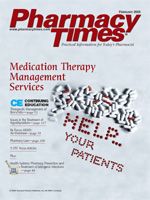Publication
Article
Pharmacy Times
Beware of Erroneous Daily Oral Methotrexate Dosing!
Low-dose methotrexate therapycan be used to treat rheumatoidarthritis, asthma, psoriasis, andother inflammatory diseases. Whenthe drug is used for these conditions,the dose is administered weekly ortwice a week. Unfortunately, it is notuncommon for the Institute for SafeMedication Practices (ISMP) to receivereports of oral methotrexate overdoses,and even fatalities, due to accidentaldaily instead of weekly dosing.
In one case, a physician decided toadd methotrexate 10 mg weekly to apsoriasis patient's daily prednisoneregimen. Methotrexate 2.5 mg tabletswere prescribed with instructions to"take 2 tablets on Monday morningand 2 tablets Monday at bedtime."Forsome reason, the pharmacy label wasunclear to the patient. Because herdoctor described the methotrexate as"supplemental therapy to her prednisone,"the patient assumed that itwas to be taken every day with herprednisone. She took 4 tablets (10 mg)daily for 1 week before being admittedto the hospital due to intolerable nausea,vomiting, and diarrhea.
Another report described a patientwho was to receive 15 mg ofmethotrexate weekly. The prescriptionwas written for the 2.5 mg tablets withinstructions to take 3 tablets every 12hours. Unfortunately, the physicianmistakenly omitted "once weekly"onthe prescription. The pharmacist whoprocessed and dispensed the prescriptionspoke to the patient and told himthat it seemed like a high dose for theconditions for which he was beingtreated. Nonetheless, the pharmacistreinforced the physician's incorrectdirections. After 6 days of treatment,the patient was admitted to the hospitalwith rectal bleeding, mouth sores,and myalgias.
In yet another report, a patientpicked up a refill of what was intendedto be a 90-day supply of metoclopramide5 mg with instructions totake 1/2 tablet (2.5 mg) 4 times daily.The vial, however, contained 360tablets of methotrexate 2.5 mginstead. The patient did not questionthe change in tablet appearance. Shetook the medication as prescribed forseveral days before she developedinternal and external hemorrhaging,which led to a lengthy hospitalizationand numerous blood transfusions.
Methotrexate is considered a high-alertmedication—a drug that bears aheightened risk of causing significantpatient harm when it is used in error.For this reason, extra precautionsshould be taken when prescribing, dispensing,or administering methotrexate.Clearly, these reports stress theunderlying need for health care practitionersto improve patient educationefforts. ISMP recommends the followingsafeguards to reduce the risk of anerror when oral methotrexate is prescribed:
- As a final quality control check,pharmacists should always reviewthe drug regimen, the frequencyof administration, and the tabletappearance with patients or caregivers.Have them repeat theinstructions to ensure that theyunderstand the weekly dosingschedule.
Drs. Kelly and Vaida are both with theInstitute for Safe Medication Practices(ISMP). Dr. Kelly is the editor of ISMPMedication Safety Alert! Community/Ambulatory Care Edition, and Dr. Vaidais the executive director of ISMP.
Report Medication Errors
The reports described here were received through the USP MedicationErrors Reporting Program, which is presented in cooperation withthe Institute for Safe Medication Practices (ISMP). ISMP is a nonprofitorganization whose mission is to understand the causes of medicationerrors and to provide time-critical error-reduction strategies to thehealth care community, policy makers, and the public. Throughout thisseries, the underlying system causes of medication errors will be presentedto help readers identify system changes that can strengthen thesafety of their operation.
If you have encountered medication errors and would like to reportthem, you may call ISMP at 800-324-5723 (800-FAILSAFE) or USPat 800-233-7767 (800-23-ERROR). ISMP's Web address is www.ismp.org.
Subscribe to Newsletter
Pharmacy Times and the Institute for Safe Medication Practices(ISMP) would like to make community pharmacy practitioners aware ofa publication that is available.
The ISMP Medication Safety Alert! Community/Ambulatory CareEdition is a monthly compilation of medication-related incidents,error-prevention recommendations, news, and editorial content designedto inform and alert community pharmacy practitioners topotentially hazardous situations that may affect patient safety. Individualsubscription prices are $45 per year for 12 monthly issues. Discountsare available for organizations with multiple pharmacy sites.This newsletter is delivered electronically. For more information, contactISMP at 215-947-7797, or send an e-mail message to [email protected].

Newsletter
Stay informed on drug updates, treatment guidelines, and pharmacy practice trends—subscribe to Pharmacy Times for weekly clinical insights.






